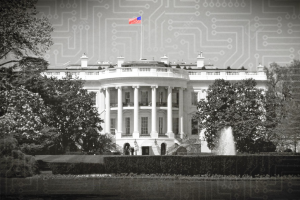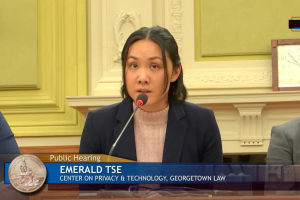Our Work
Founded in 2014, the Center on Privacy & Technology is a leader at the intersection of privacy, surveillance, and civil rights.
Latest Work

“Raiding the Genome” cited in Electronic Frontier Foundation memo
The Privacy Center's 2024 report "Raiding the Genome" was cited in this Electronic Frontier Foundation memo to the Trump administration. "A recent report from the Center on Privacy & Technology at Georgetown Law identifies many of the privacy concerns inherent in the program, including its violation of the Fourth Amendment," writes the report.

“Biden Is About to Hand Over a Vast and Unconstitutional DNA Database to Trump” Op-Ed in Truthout
Executive Director Emily Tucker published an op-ed, “Biden Is About to Hand Over a Vast and Unconstitutional DNA Database to Trump” in Truthout about the immense DNA database the Department of Homeland Security has been creating and the danger it holds especially as Donald Trump returns to office. "Every person's privacy, security and civil rights are implicated by this program," wrote Tucker.

Senior Associate quoted in the Columbia Missourian
Senior Associate Clarence Okoh spoke with reporter Lucy Valeski at the Columbia Missourian and was quoted in a piece about the incoming police cameras in Columbia, Missouri. "The technology can be used to further discriminate against people of color, who are already disproportionately impacted by over-policing, according to Clarence Okoh. ... 'The decision about where that license plate gets placed is one that is oftentimes fueled by and reflects and reproduces patterns of racial justice.'"

Privacy Center quoted in Al Jazeera English
Fritz Fellow Marianna Poyares spoke with Linh Nguyen at Al Jazeera English about how Donald Trump could leverage technology at the disposal of the Department of Homeland Security to carry out his mass deportation plan. "So, we know that when are are talking about expanding mention beds and expanding the surveillance network we’re talking about an increased number of contracts that are going to happen between the public sector and the private sector," Poyares stated.

Privacy Center signs on to letter in support of NYC’s “End Correctional Community Surveillance” Act
Senior Associate Clarence Okoh was point on signing the Privacy Center onto a national sign-on letter in support of New York City's "End Correctional Community Surveillance Act" which would end the universal recording, monitoring, and surveillance of jail calls.

Senior Associate at the Florida Public Defender Association
Senior Associate Clarence Okoh was a featured speaker at a training in Destin, FL hosted by the Florida Public Defender Association where he presented on "Digital Pushout: Challenging Surveillance Technology that Criminalizes Youth". In his talk, Clarence described how schools and law enforcement agencies leverage new surveillance technologies to transform the school-to-prison pipeline and deepen the criminalization of Black and brown adolescence. He presented to approximately 150 attendees.

Privacy Center quoted in EdSurge piece about facial recognition in schools
Senior Associate Clarence Okoh spoke with Nadia Tamez-Robledo at EdSurge for an article about facial recognition in schools. "Any conversation about safety that begins with surveillance or policing is beginning in the wrong place," Okoh stated.

“Testifying in Support of the DC Consumer Health Information Privacy Protection Act” blog
On October 17, 2024, Associate Emerald Tse testified in a hearing before the D.C. Council Committee on Health in support of the Consumer Health Information Privacy Protection Act (CHIPPA). Modeled after Washington State’s My Health My Data Act, CHIPPA would provide privacy protections for consumer health data. Her full written testimony is on our blog.

Contribution to “Information Ecosystems and Troubled Democracy” report
The Observatory on Information and Democracy published their report: “Information Ecosystems and Troubled Democracy.” This extremely relevant report explores the epidemic of mis- and disinformation and how media, AI, and Big Tech all play a role in disseminating this mis- and disinformation at the cost of democracy. Co-authored by our Executive Director Emily Tucker (and Robin Mansell, Flavia Durach, Matthias Kettemann, Théophile Lenoir, Rob Procter, Gyan Tripathi), the report helps untangle how information ecosystems resulting from human decisions and actions can have disastrous consequences for democracy.

Contribution to “Digitizing the School to Prison Pipeline” report
Senior Associate Clarence Okoh was a contributor to a recent report, Digitizing the School to Prison Pipeline: Pasco County's At-Risk Youth Program. The report was published by the NAACP Legal Defense Fund and provides a civil rights analysis of the criteria used in a school-based predictive policing program in Pasco County, Florida. The report is the latest in the longstanding advocacy of the PASCO Coalition of which Clarence is a founding member, strategist and coordinator.
